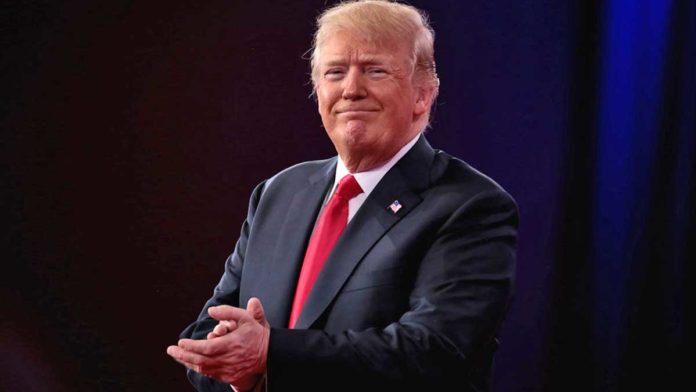When Presidential candidate Donald Trump chose religious extremist and avowed homophobe Mike Pence as his running mate instead of moderate former New Jersey Gov. Chris Christie, it was a signal of the anti-LGBTQ governance to come. Four years later, President Trump has signed executive orders against LGBTQ people and nominated dozens of anti-LGBTQ judges — including three Supreme Court justices — to lifetime appointments. Trump and Pence have catered to and made promises to evangelical Christians that have promoted so-called “religious freedom” laws that allow discrimination against LGBTQ people on “religious” grounds.
Additionally, Trump’s appointment of anti-LGBTQ zealots to his Cabinet has meant four years of attacks on LGBTQ people from nearly every quarter of the Trump administration.
Trump’s anti-LGBTQ actions as President began in January 2017, the same month he took office.
January 31, 2017: Trump nominated Judge Neil Gorsuch to the Supreme Court to fill the vacancy left by Justice Antonin Scalia. Gorsuch had a long anti-equality record, opposing crucial medical treatment for a transgender person, supporting discrimination against LGBTQ by corporations, and having written on his opposition to same-sex marriage.
March 2017: Trump sent the Center for Family and Human Rights, designated an anti-LGBTQ hate group by the Southern Poverty Law Center, to represent the U.S. at the United Nations Commission on the Status of Women. Also in March 2017, Trump insisted any references to sexual orientation or gender identity be removed from data collection surveys for the 2020 Census.
May 2017: Trump signed an executive order giving Attorney General Jeff Sessions discretion to discriminate against LGBTQ Americans and women in agencies across the federal government to protect “religious freedom.”
July 26, 2017: In a series of tweets, Trump announced he would ban qualified transgender people serving in the military. More than 15,000 transgender Americans were currently serving at the time.
September 5, 2017: Trump repealed the DACA (Deferred Action for Childhood Arrivals) program, impacting an estimated 75,000 LGBTQ immigrants and their families.
October 16, 2017: In a New Yorker profile, Trump joked that Vice President Pence wants to hang all LGBTQ people.
October 2017: Trump nominated Jeff Mateer to the U.S. District Court for the Eastern District of Texas. In a 2015 speech Mateer said, “I attend a Baptist church. We discriminate, alright. On the basis of sexual orientation, we discriminate.” Mateer also supports conversion therapy. The nomination is eventually withdrawn after even Republicans object to Mateer’s ideological stances.
December 5, 2017: White House Press Secretary Sarah Huckabee Sanders said that Trump agreed with the position articulated before the Supreme Court by his solicitor general, Noel Francisco, that businesses should be allowed to hang signs that say they won’t serve LGBTQ customers.
February 2018: Trump refused to sign a statement in support of an Inter-American Court of Human Rights’ ruling on marriage equality and transgender rights.
May 2018: Trump ordered the Bureau of Prisons to use “biological sex” in determining how transgender prisoners are assigned housing, putting them at significant risk of sexual abuse, assault, and other types of discrimination.
June 2018: The U.S. Supreme Court ruled against gay plaintiffs and the Colorado Civil Rights Commission in the case of Masterpiece Cakeshop, which refused to make a cake for a gay couple’s wedding. The Trump administration had filed an amicus brief in support of the baker.
July 2018: Trump nominated judge Brett Kavanaugh to the Supreme Court. Kavanaugh had a history of anti-LGBTQ animus. Also in July 2018, Trump established the “Religious Liberty Task Force,” an anti-LGBTQ initiative of the Department of Justice, Civil Rights division.
September 2018: VP Pence spoke at the anti-LGBTQ Values Voter Summit.
March 2019: Trump refused to sign onto a statement by United Nations member nations calling for “a swift, thorough and impartial investigation into the alleged persecution” of gays and lesbians in the Russian republic of Chechnya. The statement demanded that those responsible be held accountable.
May 2019: Trump said he would refuse to sign the Equality Act if it were passed.
June 2019: Trump banned U.S. embassies from displaying the rainbow flag for Pride month and refuses for the third year to support Pride month.
Also in June 2019, Trump refused to acknowledge the 50th anniversary of the Stonewall riots.
October 2019: In oral arguments for Bostock v. Clayton County, Georgia, the Trump administration argued that employers should be able to fire LGBTQ people because of sexual orientation or gender identity.
May 2020: Trump added anti-LGBTQ activist Jenna Ellis to his re-election campaign.
September 26, 2020: Trump nominated anti-LGBTQ Judge Amy Coney Barrett to the position of Associate Justice of the Supreme Court to fill in the vacancy left by the sudden death of Ruth Bader Ginsburg.
Throughout his presidency, Trump regularly attacked LGBTQ people or ordered his Cabinet to do so. His appointment of dozens of federal judges in lifetime positions, including three Supreme Court justices, is perhaps the most damning and lasting legacy he leaves as president. Trump created a 6-3 conservative led Supreme Court, which can effectively block any progressive laws for the next decade or more.
While a Democratic-led Congress and a Biden-Harris administration could overturn many of the anti-LGBTQ initiatives of the Trump-Pence administration, it is Trump’s judicial appointees who could determine laws regarding LGBTQ people for the next several decades. If Amy Coney Barrett lives to be Ruth Bader Ginsburg’s age and remains on the court, she could still be making anti-LGBTQ rulings in 2060. That is quite a lasting statement from a one-term president.
